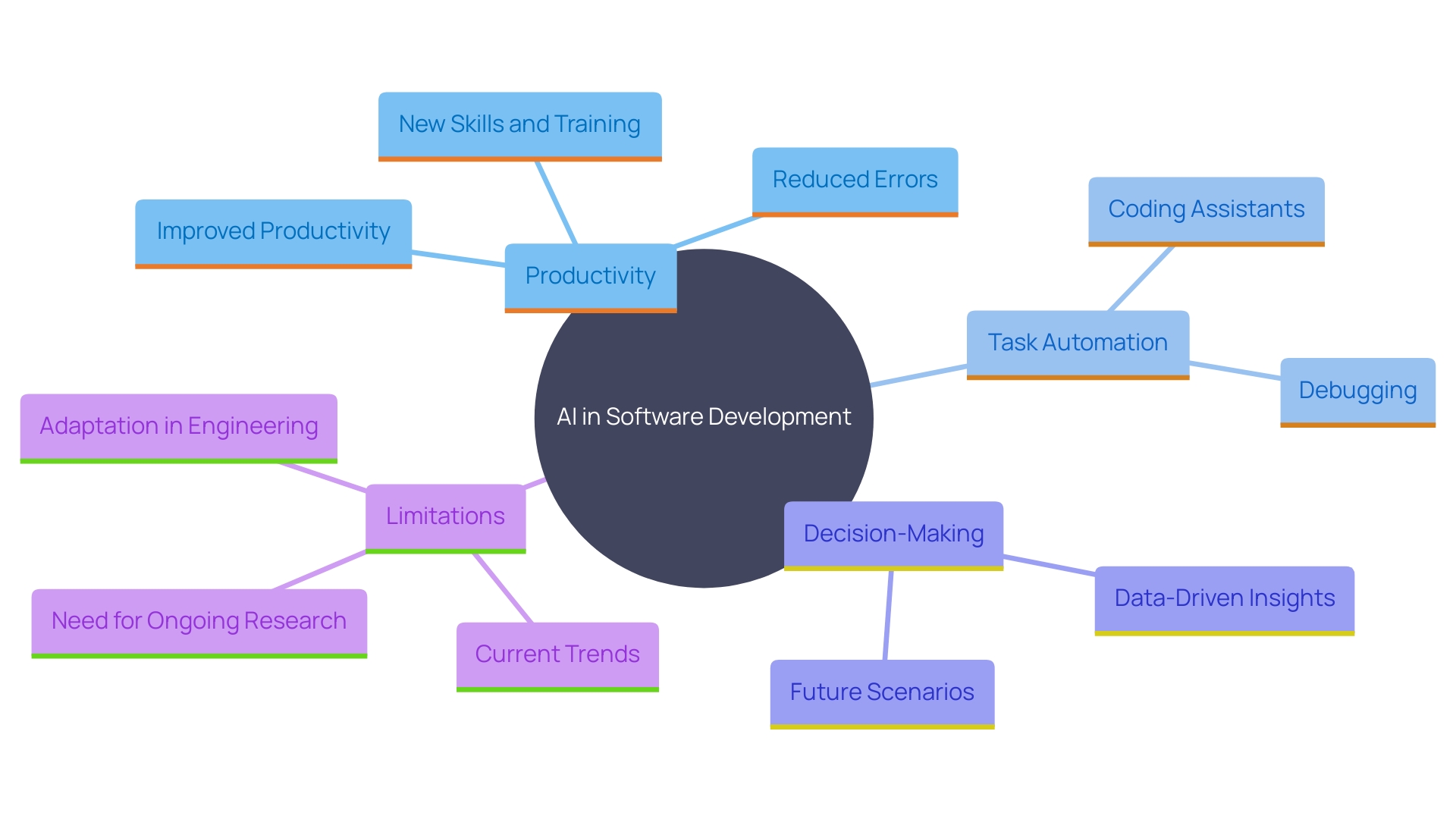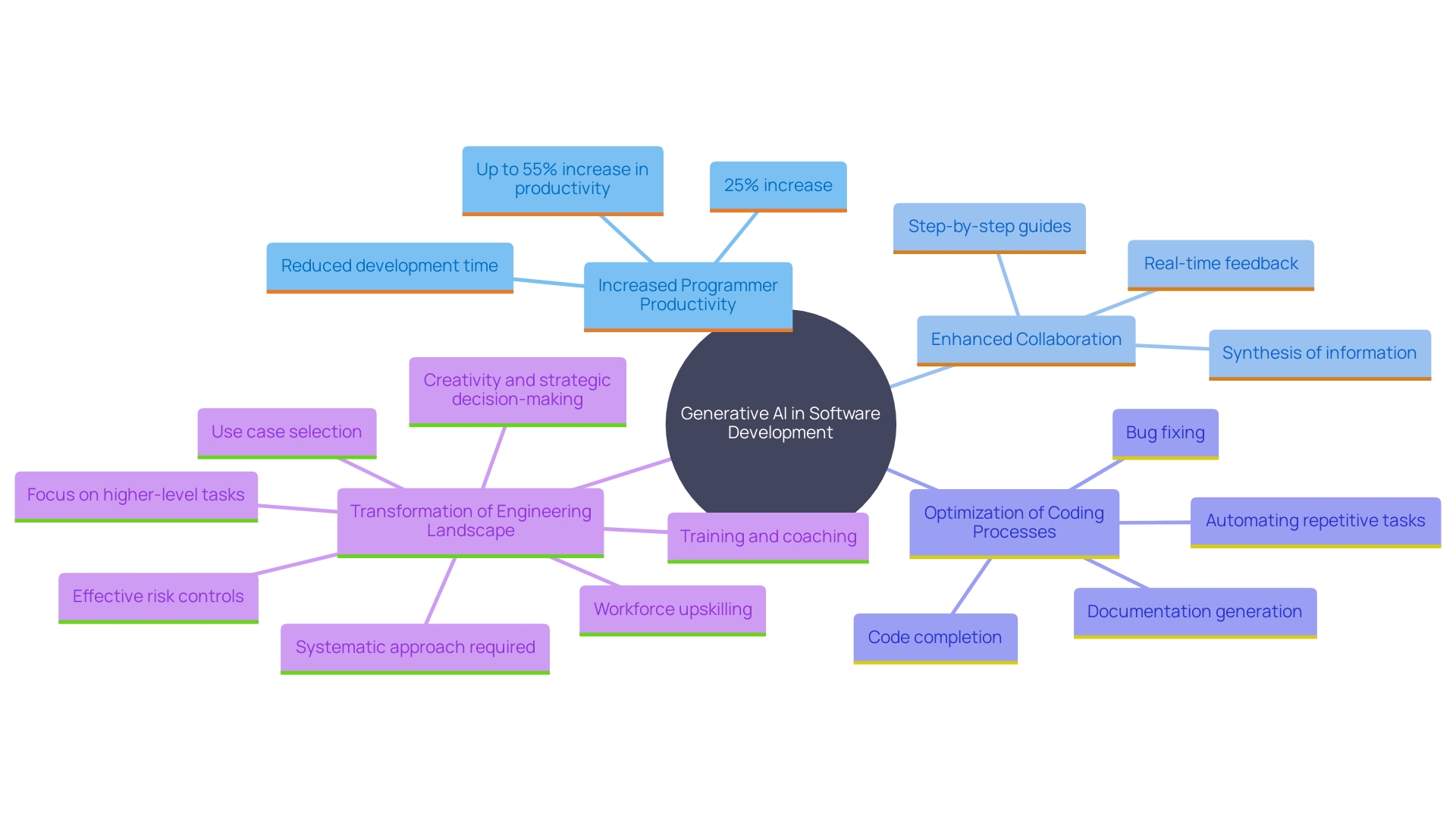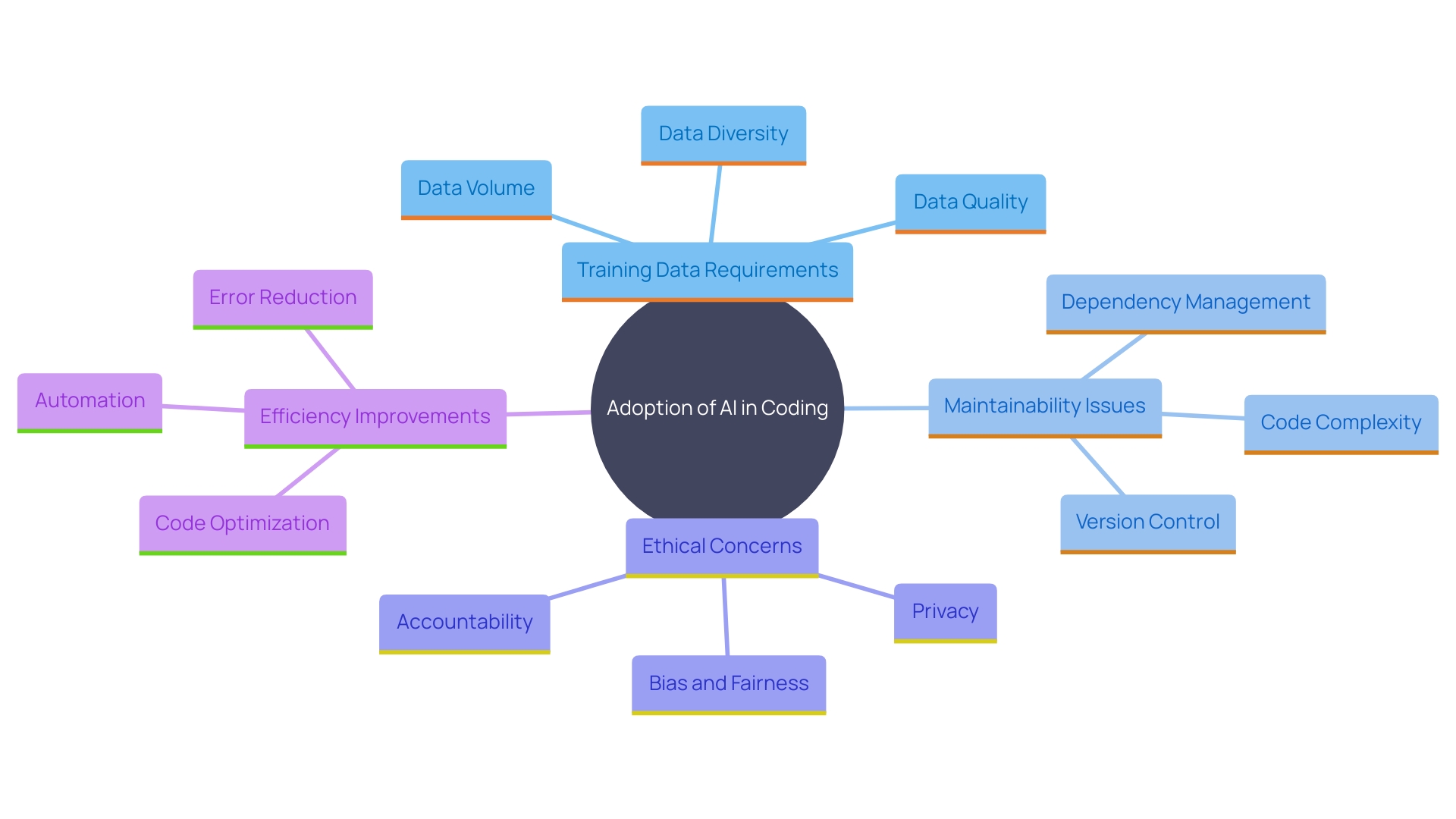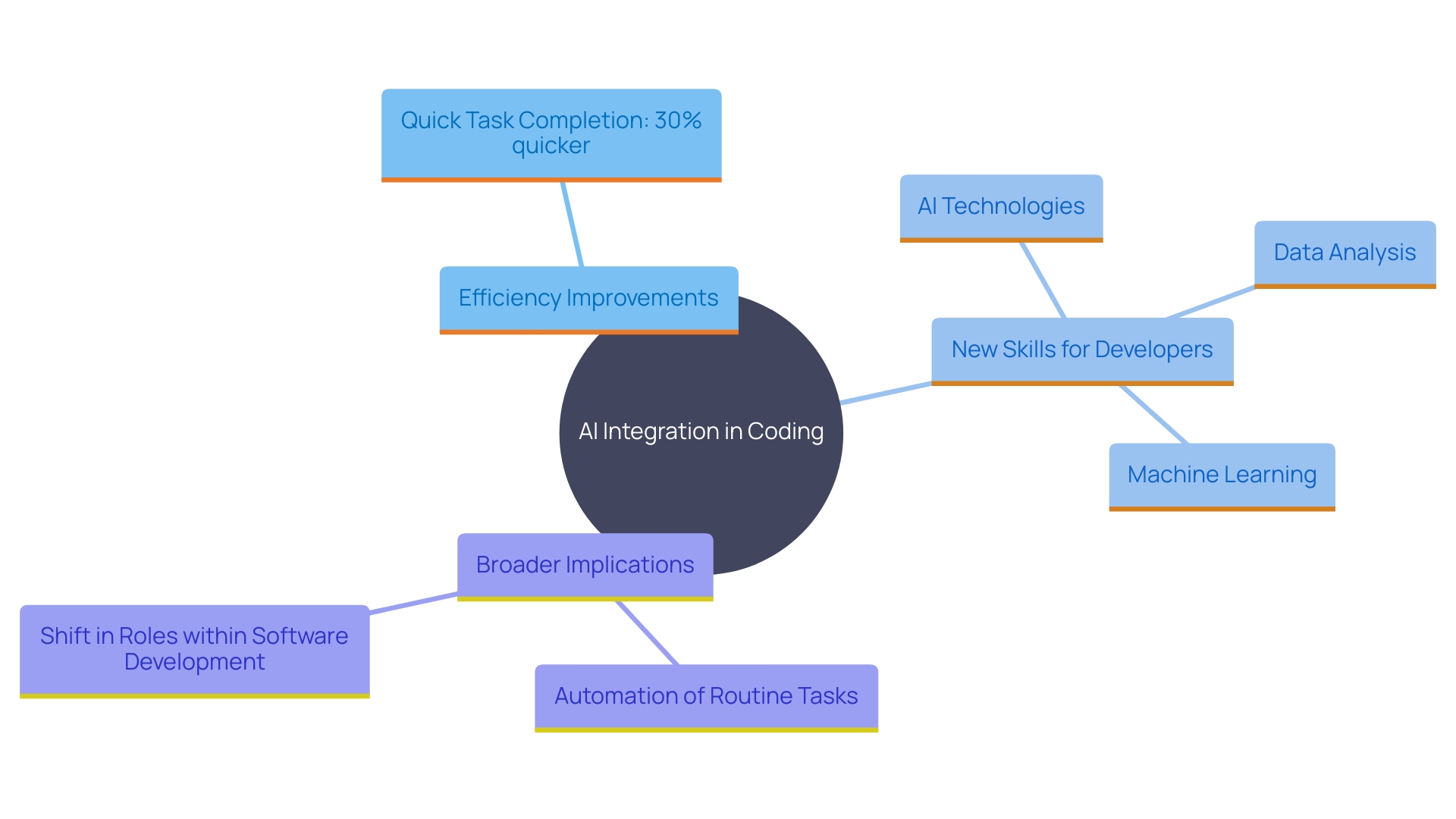Introduction
Artificial Intelligence (AI) is reshaping the landscape of software development, ushering in an era of unprecedented efficiency and productivity. By automating repetitive tasks, AI tools empower developers to focus on complex problem-solving and innovative coding, accelerating development cycles and enhancing application deployment speeds. This transformation is evidenced by a notable 25% increase in developer productivity, as AI-driven tools provide critical insights and support data-informed decision-making.
The integration of AI within the development process spans various stages, from code generation and debugging to predictive analytics and real-time feedback during code reviews. This not only streamlines workflows but also fosters collaboration and improves code quality. However, the adoption of AI is not without its challenges.
Issues such as the need for extensive training data, maintaining AI-generated code, and addressing ethical concerns like bias and privacy are significant hurdles that developers must navigate.
As AI technologies continue to advance, the future of coding will increasingly hinge on the effective collaboration between human developers and AI systems. This symbiotic relationship promises to revolutionize software development, driving major efficiency gains and enabling engineers to focus on high-value tasks. The ongoing evolution of AI tools heralds a transformative era in software engineering, where human expertise and AI capabilities converge to deliver superior software products and innovative solutions.
The Impact of AI on Software Development
Artificial Intelligence (AI) has revolutionized software creation, introducing transformative practices that streamline the entire process. By automating repetitive tasks, AI resources allow programmers to focus on addressing intricate issues and participating in innovative coding. This shift not only boosts productivity but also significantly accelerates the development cycle, leading to quicker iterations and faster application deployment.
AI-powered resources offer essential insights, assisting creators in making data-informed choices. 'Based on a Turing study, the incorporation of generative AI resources has led to a 25% average rise in programmer productivity, highlighting the significant effect of AI on project delivery and innovation cycles.'. Moreover, the extensive use of AI resources is clear, with many developers employing ML-based autocomplete functions, whether through internal company resources or commercially available products. These instruments improve the effectiveness of different phases of software creation, from code review to bug management.
Despite these advancements, it's crucial to acknowledge the limitations of AI in handling highly specialized or unfamiliar tasks. Developers generally view AI as an efficiency-enhancing assistant rather than a replacement, recognizing the need for continuous improvement and adaptation. As AI technology advances, the software creation community must establish common benchmarks to address a broader range of engineering tasks, ensuring the practical application of AI in real-world scenarios.
The future of software creation is set for significant transformations as AI tools keep progressing, aiding a sector with an estimated 27 million programmers globally. Google's ongoing progress in AI-based assistance highlights the potential for even greater enhancements in productivity and satisfaction for those who create software. By leveraging AI-human collaboration, the software development process becomes more efficient and comprehensible, enabling stakeholders to make better-informed decisions.

Advantages of AI Tools for Developers
'Generative AI applications provide significant advantages for developers, from software generation and debugging to predictive analytics.'. By analyzing vast datasets, these tools can identify patterns and suggest optimizations, significantly reducing manual coding time. For instance, Intuit has utilized generative AI to unify programming and documentation among different teams, resulting in more seamless product creation and ongoing integration processes.
Moreover, AI enhances collaboration by offering real-time feedback during code reviews, which improves code quality and minimizes errors prior to deployment. Turing's AI-accelerated research study revealed a 25% increase in programmer productivity, showcasing generative Ai's potential to expedite software projects and enhance innovation cycles. Furthermore, Google's internal AI-driven resources have shown considerable enhancements in programmer productivity and contentment by optimizing their software creation settings.
Generative AI resources are not only transforming code creation but also reshaping the broader engineering landscape. They streamline complex processes, allowing developers to focus on high-value tasks and deliver superior software products. As AI technology continues to evolve, integrating these resources into development workflows will likely become even more essential, driving efficiency and innovation in software engineering.

Challenges and Limitations of AI in Coding
The integration of AI in coding presents unique challenges that need to be effectively addressed for successful adoption. One significant hurdle is the requirement for extensive training data to ensure AI models function effectively. The quality of the AI-generated output is directly tied to the quality of the input data, making it imperative to manage data meticulously.
Developers also encounter challenges in understanding and maintaining AI-generated scripts, which can complicate debugging and lead to potential issues in maintainability. Research has indicated that AI applications such as GitHub Copilot can lead to a notable increase in churn scripts and a troubling decline in script reuse, emphasizing the necessity for diligent supervision.
Furthermore, ethical concerns such as bias, privacy, and accountability must be addressed to build trust in AI systems. Clear guidelines on appropriate use cases and limitations are essential to harness Ai's potential to enhance, rather than replace, human coding abilities. For example, resources such as AI Code Explorer have been created to enhance code understanding and teamwork, aiming to decrease the time programmers spend grasping unfamiliar code and thereby increasing efficiency.
In practice, some engineering organizations using AI-based coding assistants have observed efficiency improvements of 10% to 15%. However, these gains are not always fully realized due to challenges in reallocating saved resources effectively. 'Tackling these challenges with clear and understandable AI models, and by creating resources that enable creators, is essential for the responsible and effective incorporation of AI in software creation.'.

The Future of Coding: AI Integration and Human Skills
As AI technologies advance, the future of coding will increasingly involve collaboration between human developers and AI systems. AI-driven coding aids and resources are poised to transform the software development process by improving efficiency and minimizing mistakes. According to recent studies, teams employing AI resources can finish tasks roughly 30% quicker than those using conventional methods. 'This efficiency increase is substantial, given that 76% of programmers are already utilizing or intending to incorporate AI resources in their workflows this year.'.
The integration of AI in coding is not just about speed but also about reshaping the roles and responsibilities of developers. Engineers will need to adapt and cultivate new skills, such as understanding AI technologies, data analysis, and machine learning concepts, to fully leverage Ai's potential. The transition to an era of AI-powered workflows is expected to bring about major efficiency gains and cost savings across various industries.
Moreover, the broader implications of AI in engineering are profound. AI-powered tools can automate routine tasks, allowing engineers to focus on more complex problem-solving and innovation. For instance, AI can handle code migrations and production debugging, areas where benchmarks like SWEBench and prototypes from Cognition AI have shown promising results. The future will likely see a community-driven push for more comprehensive benchmarks to cover a wider range of engineering tasks.
The impact of AI on coding is transformative, enhancing capabilities and fundamentally changing software development. As more developers trust and integrate these tools into their workflows, the synergy between human expertise and AI capabilities will drive significant advancements in the field.

Conclusion
The integration of Artificial Intelligence (AI) into software development marks a significant turning point in enhancing productivity and efficiency. By automating repetitive tasks, AI tools empower developers to focus on complex problem-solving, resulting in faster development cycles and improved application deployment. The impressive 25% increase in developer productivity highlights the transformative impact of these technologies on project delivery and innovation.
AI tools not only streamline various stages of development, from code generation to bug management, but they also foster collaboration through real-time feedback during code reviews. This collaborative approach enhances code quality and minimizes errors, further accelerating the development process. As AI continues to evolve, its role in reshaping the engineering landscape becomes increasingly critical, allowing developers to concentrate on high-value tasks and deliver superior software products.
However, challenges remain in the widespread adoption of AI technologies. Issues such as the need for extensive training data, the complexity of maintaining AI-generated code, and ethical concerns surrounding bias and privacy must be addressed to ensure a responsible integration of these tools. By establishing clear guidelines and benchmarks, the software development community can navigate these hurdles and fully harness the potential of AI.
Looking ahead, the future of coding is poised for a revolution driven by the synergy between human developers and AI systems. As AI tools become more integral to development workflows, the focus will shift towards cultivating new skills and adapting to an AI-powered environment. This evolution promises not only to enhance efficiency but also to fundamentally change the roles of developers, paving the way for a more innovative and productive software development landscape.
Frequently Asked Questions
What role does AI play in software creation?
AI automates repetitive tasks in software development, allowing programmers to focus on complex problems and innovative coding. This shift enhances productivity and accelerates the development cycle, resulting in faster application deployment.
How does AI improve programmer productivity?
According to a Turing study, integrating generative AI resources has led to an average 25% increase in programmer productivity. AI tools provide insights and optimize various stages of software creation, from code reviews to bug management.
What specific AI tools are commonly used by developers?
Many developers utilize ML-based autocomplete functions and AI-driven coding assistants. These tools enhance collaboration by offering real-time feedback and improving code quality, thereby reducing errors before deployment.
Are there limitations to using AI in software development?
Yes, AI struggles with highly specialized or unfamiliar tasks. Developers see AI as a supportive tool rather than a replacement, emphasizing the need for continuous improvement and adaptation.
What challenges do developers face when integrating AI into their workflows?
Challenges include the need for extensive training data, understanding AI-generated code, ethical concerns (such as bias and privacy), and maintaining AI-generated scripts. Efficient supervision is vital to address these complications.
What is the future of AI in software development?
As AI technologies evolve, the integration of AI in coding will become more prominent. It is expected to enhance efficiency, minimize mistakes, and necessitate new skills from developers, including data analysis and machine learning.
How can AI impact the engineering landscape beyond coding?
AI can automate routine tasks, allowing engineers to focus on complex problem-solving. Tools like AI can assist in code migrations and debugging, potentially transforming the broader engineering field.
What are the implications of AI for the roles of developers?
The roles of developers will shift as they adapt to AI tools. They will need to cultivate new skills to fully leverage AI's potential, leading to major efficiency gains and cost savings in various industries.
How can organizations ensure the responsible use of AI in software creation?
Organizations must establish clear guidelines on the use of AI, focusing on data quality and ethical considerations. Additionally, creating resources that enhance code understanding and teamwork will be essential for effective AI integration.
What are the expected efficiency gains from using AI in software development?
Teams using AI resources can complete tasks approximately 30% faster than those using traditional methods. This highlights the significant potential for AI to improve efficiency across software development workflows.




